|
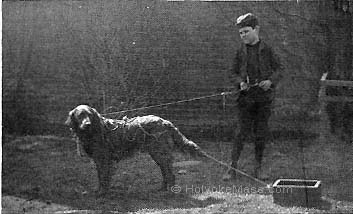
A Dog Tram.
|
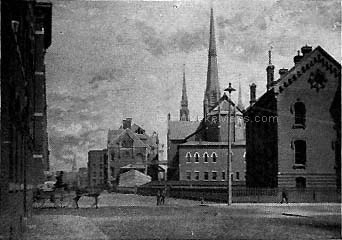
Park Street.
|
The secret of thrift is forethought. Its process is saving for use; it involves also judicious spending. The thrifty man saves; savings require investments in stable and remunerative forms; hence that order and condition of things we call civilization, which does not exist until one generation passes on the results of its labors and savings to the next. Thus thrift underlies civilization as well as personal prosperity. The moment it ceases to act society retrogrades toward savagery, the main feature of which is absence of forethought. A spendthrift or older is essentially a savage; a generation of them would throw society back into barbarism. There is a large number of young men — chiefly to be found in cities — who rise from their bed at eleven or twelve; breakfast in the clubhouse; idle away the afternoon in walking or driving; spend a part of the evening with their families, the rest at some place of amusement or in meeting the engagements of society, bringing up at the clubhouse or some gambling den or a place of worse repute, and early in the morning betake themselves to bed again. They do no work; they read but little; they are as a class vicious. I depict them simply to classify them. These men are essentially savages. Except in some slight matters of taste and custom, they are precisely the individual Stanley found in Central Africa, with some advantages in favor of the African. Some years ago, Mr. Buckle startled the reading world by putting the Roman Catholics of Spain and the high Calvinists of Scotland in the same class, as alike in the generic trait of bigotry, though differing in matters of belief. Precisely in the same way, and with the same logical correctness, these idlers are to be put in the same category with savages. They live under the fundamental characteristic of savagery, namely, improvidence. Our young man of leisure has a rich father, and the African has his perennial banana, and, upon the whole, a rather surer outlook.
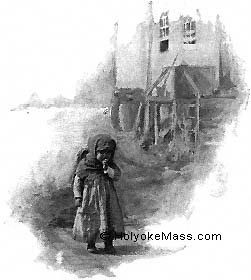
A Little Italian.
|
The chief distinction between civilization and barbarism turns on thrift. Thrift is the builder of society. Thrift redeems man from savagery.
What are its methods?
(I.) I name the first in one word—save. Thrift has no rule so imperative and without exception. If you have an allowance, teach yourself on no account to exhaust it. The margin between income and expenditure is scared ground, and must not be touched except for weightiest reasons. But if you are earning a salary—it matters not how small—plan to save some part of it. If you receive seventy-five cents per day, live on seventy; if one dollar, spend but ninety; you save thirty dollars per year—enough to put you into the category of civilization. But he who spends all must not complain if we set him down logically a savage. Your saving is but little, but it represents a feeling and a purpose, and, small as it is, it divides a true from spurious manhood.
Life in the last analysis is a struggle. The main question for us all is, Which is getting the advantage, self or the world? When one is simply holding his own, spending all he earns, and has nothing between himself and this "rough world," he is in a fair way to be worsted in the battle. He inevitably grows weaker, while the pitiless world keeps to the pitch of heavy exaction.
|
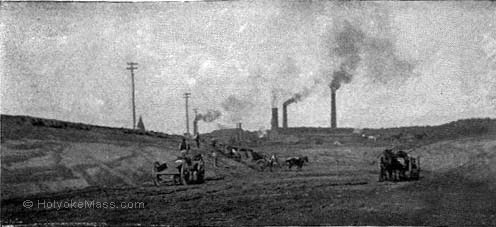
Digging A Canal.
|
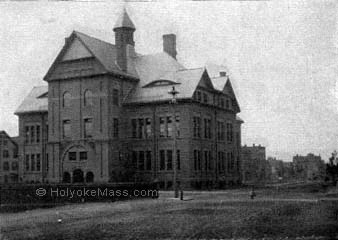
Park Street School.
|
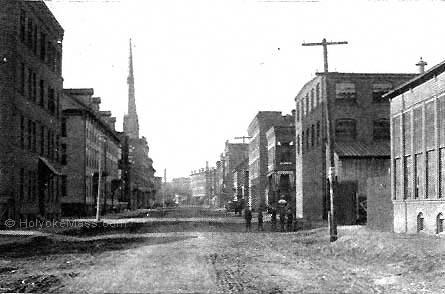
Lower Cabot Street.
|
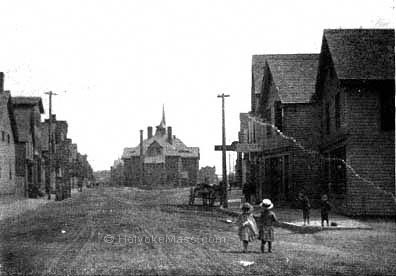
Park Street, Corner Adams.
|
© Laurel O’Donnell 1996 - 2006, all rights reserved
This document may be downloaded for personal non-commercial use only
and may not be reproduced or distributed without permission in any format.
This is an edited adaptation from the original publication.
|
|
|